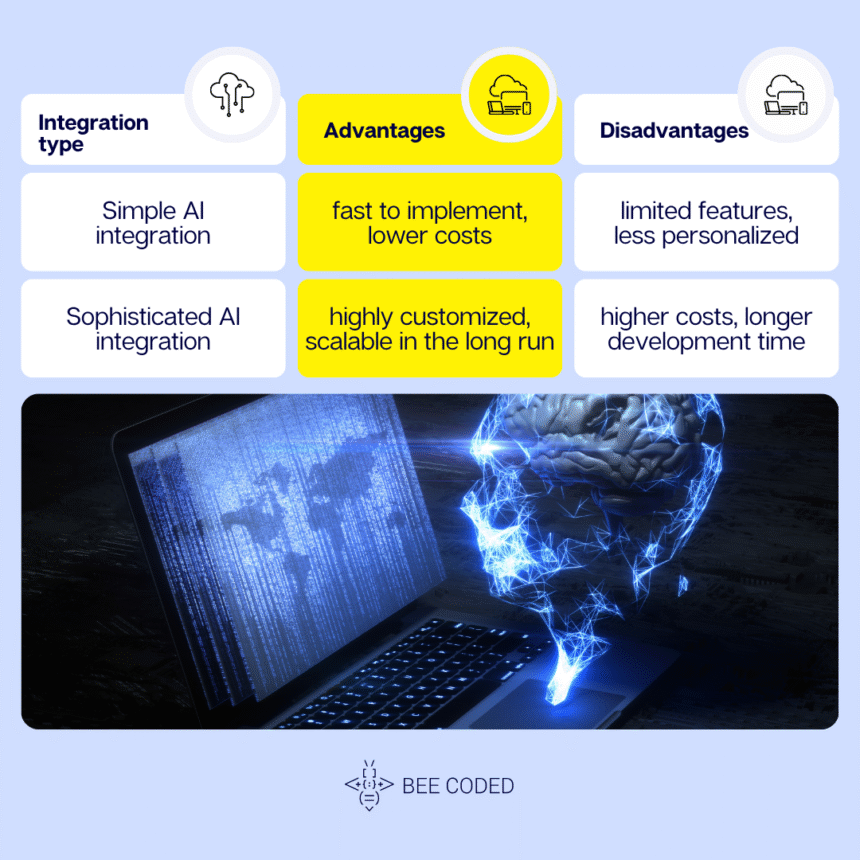AI in SaaS products? Yes, it becomes a reality more and more present.
Artificial intelligence has taken over a lot of industries, with each one trying to optimize its processes through the benefits AI brings. When it comes to the SaaS sector, AI integration is used for multiple purposes, like automating workflows or predictive analytics.
According to a Gartner report, by 2026, 80% of enterprises will have already incorporated AI into their processes. So, it is time to make sure you will be one of them. Get ready to embark on the ship of the future! Read today’s article and find out everything you need to know about AI in SaaS.
What is AI in SaaS?
AI in SaaS (Software as a Service) refers to the use of artificial intelligence technologies within cloud-based software applications. Unlike traditional software, AI-enhanced SaaS adapts dynamically to business needs, delivering more efficient operations.
In short, AI allows SaaS apps to:
- automate repetitive tasks
- analyze data in real time
- personalize user interactions
- predict behaviors and outcomes.
So yes, AI and SaaS make a really good team. When used together, they help businesses make better decisions, be more productive and offer more tailored services.
Characteristics of AI SaaS solutions
Scalability
AI SaaS apps are built to scale, meaning they can handle increasing numbers of users and data without compromising performance. If your company dealing with large data volumes, this is a great advantage.
Accessibility
Because SaaS is cloud-based, these apps are easy to access from anywhere. AI features are just another layer that can be added automatically. For example, a CRM tool with AI can suggest the next step in the customer relationship based on previous data, without any manual action.
Integration
AI SaaS tools are also highly integrative. They work well when connected with other tools a business already uses. For instance, a project management platform with AI can sync with a calendar and a ticketing system.
AI Technologies in SaaS: Automation. ML. NLP
AI in SaaS is more of an umbrella term that covers several technologies working together to make applications smarter and more efficient.
AI-driven automation
This is one of the most in-demand AI technologies. AI-powered automation helps businesses save time and reduce human error. According to McKinsey, AI can automate up to 60–70% of time-consuming and repetitive tasks like data entry. Those numbers are pretty hard to ignore, right?
Use cases examples:
– in finance: automatic invoice validation
– in HR: candidate screening and workflow automation
Machine Learning for predictive analytics
Machine learning refers to training algorithms to spot patterns in massive datasets. In SaaS, this can help:
- detect which users might churn
- anticipate campaign performance
- recommend actions based on past behaviors etc.
Natural Language Processing (NLP)
NLP allows systems to understand and process human language. It’s one of the most exciting AI technologies because it involves an actual conversation with the system. In SaaS, NLP is used for:
- virtual assistants
- analyzing customer support messages
- summarizing conversations and documents
Find out more about NLP here.
Generative AI
Generative AI can create content (images, texts etc) based on a dataset. It’s different from conversational AI, which only responds within a conversation. In SaaS, generative AI can help with:
- generating product descriptions
- writing personalized emails
- creating reports from raw data etc.
Simple AI integration vs Complex AI integration
When it comes to actually integrating AI into SaaS, there are two main approaches:
Simple AI Integration
This means using pre-built AI models or external APIs. It’s a fast, cost-effective option for companies that want AI features without building them from scratch.
Example: Chatbots for customer support.
Sophisticated AI Integration
This involves developing proprietary AI models tailored to specific business use cases. It’s more resource-intensive but offers greater customization and long-term value.
Example: HubSpot AI – advanced automation and marketing tools based on user behavior.
Benefits of AI in SaaS: Why it matters?
1) Easier scalability – apps can handle more data, users and interactions without losing performance.
2) Personalization – AI-powered SaaS platforms learn user behavior and personalize the experience over time. For example, an email marketing tool might suggest the best time to send an email based on previous open rates.
3) Saves time + boosts efficiency – By automating repetitive tasks, teams have more time to focus on high-value work.
4) Faster customer support – AI chatbots can handle FAQs instantly, reducing wait time and increasing satisfaction.
Real-world use cases of AI in SaaS
Slack
Slack is a team collaboration and communication platform. Its AI features include:
- automatic conversation summaries
- daily channel recaps
- note-taking during calls
- smart search pulling data from messages, files, and integrated tools.
Shopify
Shopify is an eCommerce platform for building and managing online stores. AI in Shopify helps merchants:
- clean up product photos (change/remove backgrounds)
- write product descriptions, emails, FAQs
- suggest quick replies during live customer chats
Asana
Asana is a project management tool and its AI features can:
- automate repetitive tasks (like assigning requests or setting deadlines)
- suggest project timelines or flag potential delays
- let teams build their own AI-powered workflows for intake, planning, and resource management (no coding needed).
Integrate AI in your SaaS product
So you want to automate operations, personalize user journeys or make smarter decisions based on real data? AI can help you get there.
Want to integrate AI into your SaaS product? Or maybe you’re just starting out and want to build a SaaS app from scratch with AI technologies already in place? The BEE CODED team is ready to team up, with scalable SaaS development solutions.


